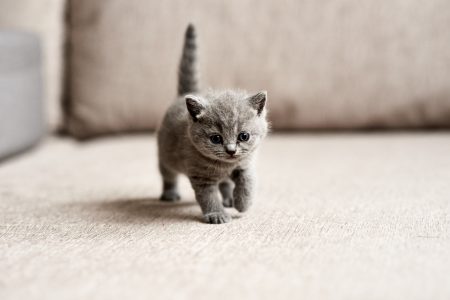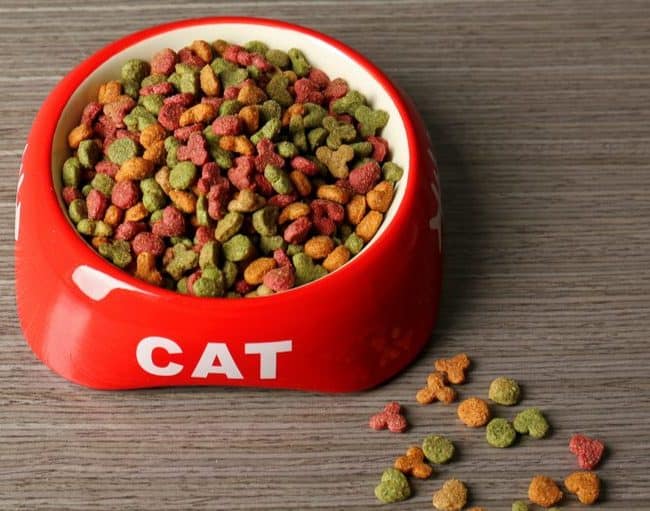There are several things to keep in mind when choosing the best cat food for your pet. Start with three of these key considerations to make sure you are meeting their specific nutritional needs.
Did your cat just celebrate her first birthday? Her ninth? As cats get older, they need age-appropriate cat food.
Kittens (under age 1):

We recommend feeding a combination of dry and canned foods in order to get them used to each. Both food types have their benefits, so the combination gives kittens the benefits of each. Also, kitten’s lives are enriched when you make them hunt or work for their food by using food puzzle toys.
Adult Cats (1-9 years):
If your fur baby’s behavior changes as she approaches the one-year mark, don’t be surprised. She’s beginning adolescence and then moving on to adulthood, life stages that correspond to the human ages of 12-27 (Junior) and 28-50 (Prime).
Technically, cats are considered to be adults at the age of one year and that will extend through year eight, but age is not necessarily a determining factor in how active your cat will be. Many cats will be
very lively well into their double-digit years. For this reason, one of your considerations for feeding a young adult cat should be activity level. An average kitty will need enough food for “maintenance” energy to go about her daily activities, but if your cat is extremely active and spends hours sprinting around the house, she’ll need a few more calories to sustain her. If your pet likes to laze in the sunshine all day, she might require carefully measured meals to keep her trim. Obesity and overweight pets are very common and serious problems. Talk to your vet about your cat’s activity level, as they can help you determine if your cat needs more or less calories.
Adult cats require the right amount of fat and protein in their meals as well as other nutrients like taurine. Homemade diets have some benefits but most of them are not well balanced. Consult your veterinarian to make sure the food is nutritious for your pet. Consider the Royal Canin or Hill’s® Science Diet® lines of cat food. These products, ranging from kitten food all the way up to senior cat food, provide balanced nutrition in a variety of options for adult cats of all ages, breeds, sizes and activity levels, including hairball, sensitive stomach and light formulas. You can order these and other foods through our online store and have them delivered to your home.
Senior Cats (age 9+)
As she ages, your fur baby may start to seek more attention from you, become more affectionate, and reduce her activity level. As her behavior changes, so do her meal time needs. You’ll need to ensure she gets the nutrients she needs while staying properly hydrated. Always make sure your cat has access to clean, fresh water. This is a time of life when cats’ nutritional needs shift, whether because of medical issues or simply aging. In some instances, too much or too little of any one ingredient may impact her health. Therapeutic diets can help you manage certain diseases in your pet. During this stage, continue to keep an eye on your cat’s weight as her activity level may decrease, which could lead to obesity. Avoid the calorie-rich food formulated for kittens and young adult cats.
Watching her calorie intake not only keeps her weight in a healthy range but also reduces the risk of diseases, such as kidney disease, certain cancers and osteoarthritis. Another concern for elderly cats is being underweight. Both wet food and dry food provide your cat with the ingredients she needs, but there are upsides and downsides to each. Older cats often have worn or missing teeth, so she might appreciate something a little softer. Some pet parents try a combination of the two, or add just a little wet food — or even some fresh water — to dry kibble. Your cat certainly will let you know her preference, and the two of you can work together to find the perfect fit.
In addition to a nutrient-rich food, your cat needs to stay hydrated in order to stay healthy. This is especially true for senior and geriatric cats, for whom dehydration can be a side effect of certain medical conditions.
There are, of course, exceptions for each cat life stage if there are medical concerns or other issues to address, at which time you should consult with your veterinarian. Your vet can also help you determine the best feeding schedule for your cat including how much to feed at each life stage as well as when to feed throughout the day. Choosing the best cat food for your best pal will help to keep her healthy, no matter whether she’s young or young at heart.
